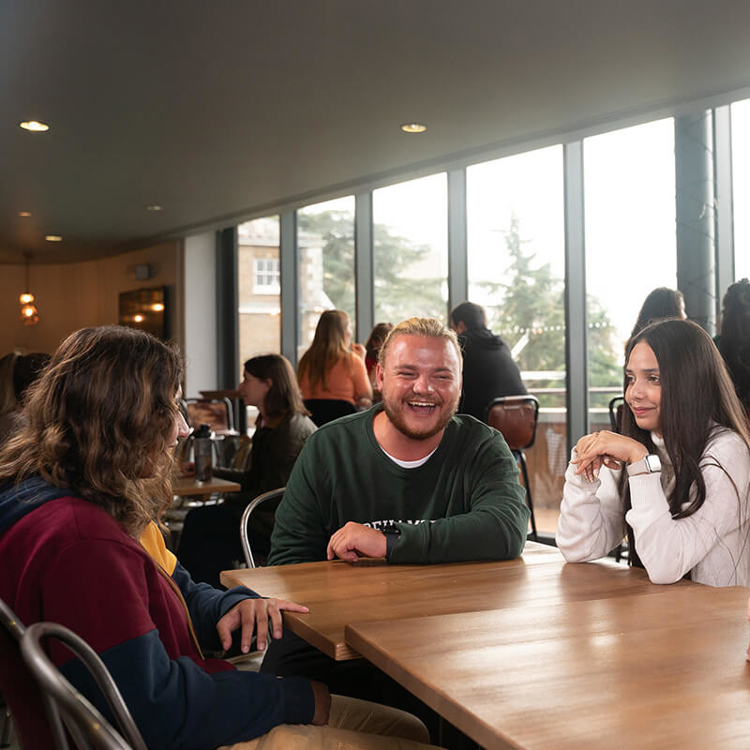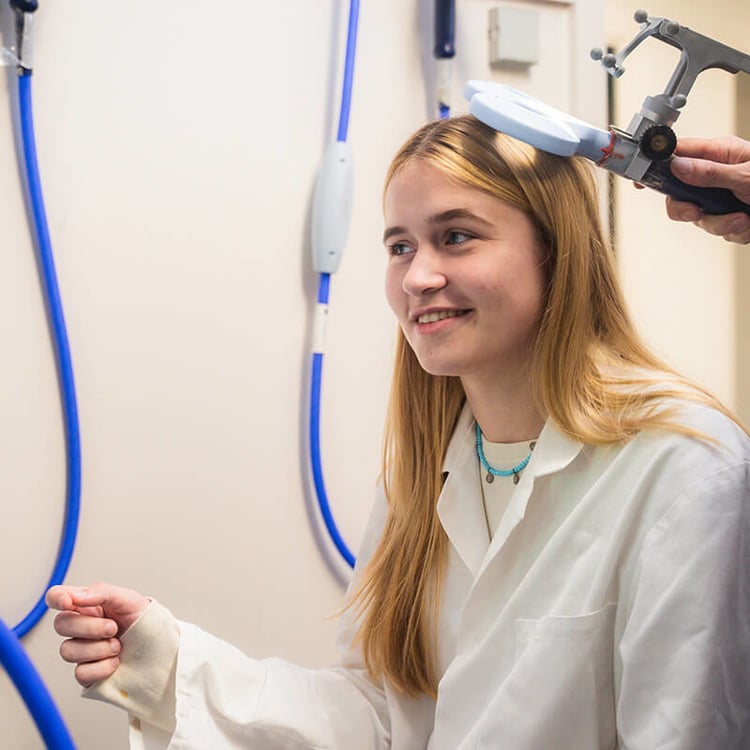Duration:
3 years (full-time)
4 years (part-time)
Number of credits:
PsychD: 120 credits at Level 7, plus 420 credits at Level 8 (Doctoral)
Start date(s):
September 2026
The PsychD in Counselling Psychology at the University of Roehampton is designed to help you grow into a confident and adaptable practitioner, ready for professional Registration with the HCPC.
You will strengthen your clinical, academic, and interpersonal abilities so you can build a rewarding career across a range of settings. A focus on self-awareness, ethical practice, and personal resilience supports your development throughout the programme.
Equity, diversity, and inclusion are central to your learning. The curriculum, teaching, and assessment are designed to be inclusive, accessible, and reflective of the UK’s diverse communities. A dedicated module, Social Justice, Equity and Inclusivity in Counselling Psychology, explores EDI in frontline clinical work. Students from under-represented backgrounds are supported through flexible study options, inclusive teaching methods, and a relational approach that values lived experience and social justice.
You will be prepared for varied professional roles within and beyond therapy. These may include clinical practice, research, supervision, teaching, leadership, and consultancy. The programme strengthens your ability to apply evidence-based knowledge, reflective thinking, and transferable skills sought by employers in the NHS, third sector, private practice, and academia.

The curriculum encourages you to engage with local, national, and international issues affecting mental health and wellbeing. You will consider how cultural, political, and systemic factors influence theory and practice. International partnerships, research, and socially responsive placements prepare you to work within an interconnected world.
You will also be supported to reflect on your professional and personal responsibility for environmental, social, and economic sustainability within psychological practice. You will consider the sustainability of therapeutic approaches, services, and institutions, and learn to contribute to wider systemic change that promotes wellbeing, fairness, and ethical care.
Finally, the programme strengthens your digital capability so that you can evaluate and use digital tools and AI ethically in clinical and academic settings. Innovative digital learning environments support accessibility, creativity, and engagement for all students.
Modules
This module will develop your critical and reflexive understanding of counselling psychology and its evolving practices. Grounded in person-centred foundations, you will explore the discipline’s history, identity, and theoretical development within diverse and ethically complex contexts. Learning combines lectures, workshops, clinical placements, supervision, and guided study to integrate theory with practice.
You will critically engage with major therapeutic frameworks, including Cognitive Behavioural Therapy and Psychodynamic Psychotherapy, alongside contemporary issues such as digital therapy, ethics, and remote practice. Assessment supports both academic and professional growth through formative and summative tasks, supervision, personal therapy, and placement experience, all contributing to your personal and professional development portfolio.
This module explores the essential foundations of person-centred therapy within a pluralistic and integrative context, focusing on the development of effective therapeutic relationships. You will engage with key person-centred concepts such as empathy, unconditional positive regard, and congruence, which are crucial for creating a supportive therapeutic environment.
Through experiential learning, including role-plays and reflective exercises, you will enhance your counselling skills while fostering self-awareness in relation to equity, diversity, and inclusion. The module examines anthropological, relational, and ethical foundations of person-centred therapy, equipping you to work with diverse client populations.
This module will develop your professional and ethical skills in counselling psychology, focusing on assessment and formulation within a humanistic framework. Through lectures, workshops, and guided study, you will explore key concepts such as the Simms Model of assessment, Foucault’s historical perspectives on madness, and the Rosenhan Experiment.
You will engage with differential diagnosis using the DSM, assess anxiety and depression with established tools such as the Beck Depression Inventory, and apply the Power Threat Meaning Framework to support client understanding. The module also examines ethical and legal principles from the HCPC and BPS, ensuring you are prepared to manage issues of consent, confidentiality, and risk in professional practice.
This module will introduce you to the clinical and institutional factors that influence the advancement of social justice within counselling psychology and the wider mental health professions. You will explore how historical, ideological, and systemic structures can both support and hinder equity, including the impact of AI on access to care.
Through critical engagement with themes such as diagnosis, neoliberalism, medicalisation, inclusion, and societal oppression, you will examine intersubjectivity, identity, and global understandings of distress from existential, feminist, queer, critical race, neurodiversity, and anti-colonial perspectives.
Workshops and formative assessments will help you develop and evaluate your understanding, preparing you for summative assessments and for applying social justice principles in your professional practice.
This vital module equips trainee counselling psychologists with critical, reflexive research skills. Through exploring paradigms, ethics, and methodologies, students develop a doctoral proposal that forms the foundation for impactful, original research—enabling them to contribute meaningfully to evidence-based practice, professional development, and broader psychological and social transformation.
This year-long module will provide an advanced understanding of Cognitive Behavioural Therapy (CBT) within counselling psychology, integrating theory, practice, and professional development. You will explore the development of CBT from Skinner to Hayes and gain skills in formulation and interventions such as Thought Records and behavioural exposure.
Focus areas include the impact of core beliefs on mental health and the application of CBT to disorders such as depression, anxiety, OCD, and PTSD. You will also examine contemporary developments, including digital self-help, transcultural approaches, Acceptance and Commitment Therapy, and transdiagnostic practice.
Teaching includes lectures, professional development groups, and asynchronous learning through videos, podcasts, and reading. You will also complete 55–120 hours of supervised clinical placement, applying CBT in real-world settings.
By the end of the module, you will be equipped to deliver ethical, reflective, and evidence-based CBT interventions across diverse clinical contexts.
This module will provide doctoral-level trainees with an in-depth exploration of psychodynamic theory and practice within a contemporary context. You will integrate foundational psychodynamic concepts with modern therapeutic approaches, focusing on the relational dynamics that shape the therapeutic process.
Key topics include attachment theory, interpersonal neurobiology, and the wisdom of trauma, alongside critical engagement with the work of Freud, Klein, Jung, and contemporary thinkers. You will develop psychodynamic formulations, present clinical work, and apply equity, diversity, and inclusion principles through intersectional and culturally responsive models such as Internal Family Systems.
Workshops and formative assessments will support your learning, helping you refine skills and prepare for summative assessments. By fostering reflection and self-awareness, this module will enhance your professional and personal development, equipping you to practise psychodynamic therapy effectively across diverse settings.
This year-long Year 2 module will equip you with the knowledge and skills to conduct ethical and methodologically rigorous research in counselling psychology. You will explore key ontological and epistemological paradigms and develop competence in qualitative, quantitative, and mixed-methods designs.
The module emphasises research ethics, safeguarding, data management, and navigating NHS and university approval processes. Learning combines lectures, workshops, practical exercises, and guided study, covering research design, reflexivity, and preparation for the RDCom3 upgrade.
Assessment includes a formative ethics application draft and a summative RDCom3 Portfolio Upgrade Submission, comprising a presentation, methodology chapter, and reflective account.
By completing this module, you will enhance your critical thinking, ethical reasoning, and research skills, preparing you for independent doctoral research and professional practice as a practitioner-researcher.
This year-long module will develop your professional competence in counselling psychology across diverse clinical, theoretical, and service contexts. Grounded in a pluralistic framework, it emphasises multi-theoretical formulation and integration of therapeutic approaches.
You will study Systems Theory, Family Systemic Practice, psychiatric diagnosis, psychopharmacology, EMDR, and service evaluation to support ethical, evidence-informed practice.
Supervised clinical placements allow you to consolidate skills across person-centred, psychodynamic, CBT, or integrative therapies, including work with acute mental health, forensic, youth offending, and specialist populations, while considering global mental health and systemic inequalities.
Teaching combines lectures, professional development groups, and asynchronous learning, with formative assessments and reflective exercises guiding skill development. Careers Development Weeks support professional identity, leadership, and CPD, preparing you for HCPC-aligned pluralistic counselling psychology practice.
The Doctoral Thesis Development and Completion module supports the development and completion of your doctoral research. It covers qualitative and quantitative methodologies and analytical approaches such as Interpretative Phenomenological Analysis, Grounded Theory, Narrative Analysis, and Discourse Analysis, alongside guidance on thesis writing, viva preparation, and writing for publication.
Learning combines lectures, workshops, tutorials, group supervision, and asynchronous study to foster critical thinking and practical research skills. Formative activities, including peer-reviewed draft chapters, data analysis exercises, presentations, and mock vivas, provide feedback and highlight areas for development.
Assessment includes a 15-minute conference-style oral presentation and a doctoral portfolio comprising a 30,000-word empirical study and a 6,000–8,000-word draft article for publication, assessed via viva voce. Personalised supervision and regular feedback support skill development and ethical, high-quality research.
This module develops advanced research competencies essential for academic and professional careers in counselling psychology, preparing you to contribute to the field nationally and internationally.
Careers
The PsychD in Counselling Psychology provides the clinical, academic and research skills needed for HCPC registration, supporting a smooth transition into professional practice.
Graduates are well prepared for roles within public and private healthcare, the third sector and specialist services in the UK and overseas, subject to local recognition.
Career options include clinical practice, research, consultancy, training and leadership. Many graduates work in the NHS, education, community and charitable organisations, while others develop careers within the justice system, defence, the civil service, and commercial settings. Opportunities also exist in sport, the media and higher education, offering a wide scope for professional development.

Learning & Assessment
How you’ll learn
Learning is grounded in relational and pluralistic principles, encouraging critical thought, reflective practice, and confidence in professional contexts.
Teaching is varied and inclusive, recognising the diverse backgrounds students bring. You will learn through:
- Lectures and experiential seminars
- Group work and peer learning
- Digital resources
- Live role plays and podcast interviews
- Reflective journals
- Supervised clinical placements
Learning is structured across Levels 7 and 8, supporting clear progression. Practical tasks help build clinical insight, while written and oral activities develop academic and communication skills. Early monitoring and tailored support help those who may need additional guidance.
The Virtual Learning Environment provides recorded lectures, asynchronous tasks, shared presentations, and learning journals to enhance flexible study. Content is regularly reviewed for cultural sensitivity, and teaching encourages you to draw on personal and community perspectives.
Planned contact days are balanced with time for placements and independent research. You will contribute to programme development through feedback, student representation, and collaborative work on assessment guidance. Integration with research centres supports engagement with contemporary scholarship and professional practice.
How you’ll be assessed
Assessment is designed to support progressive development, linking each task with relevant learning outcomes and professional standards.
A wide range of formats gives you scope to demonstrate capability in clinical, academic, and research practice while engaging with digital methods. You will be assessed through:
- Reflective journals and critical reflexive essays
- Podcasts and peer-reviewed interviews
- Recorded clinical role plays
- Service evaluations
- Empirical research activities
- Case presentations and professional portfolios
Tasks are spaced across the year to prevent overload and allow dedicated periods for placement and research. High-credit, year-long modules help distribute workload evenly, and a combination of pass or fail portfolios and graded work encourages depth and consistency.
Assessment approaches mirror professional practice. Technology enhanced tasks and engagement with emerging tools foster confidence in contemporary methods. Ongoing peer and tutor feedback, structured milestones, and clear marking criteria support learning progression. Moderation, standard rubrics, and student consultation help promote fairness, accessibility, and coherence.

Gain real world skills on placement
Gain practical experience from the start of your course.
All students complete supervised clinical placements throughout their studies, building confidence within the NHS and other public services, as well as in third sector and private organisations.
Placements are supported through personal and professional development portfolios and weekly reflective practice groups.
You will apply classroom learning to real clinical cases and receive feedback from supervisors and peers. This approach helps you develop valuable skills in problem solving, communication, resilience and ethical decision-making.
Frequently asked questions
Year 1 placements need to provide opportunities for practicing person-centred therapy (minimum 100 hours). Supervision should be with someone who has training/expertise in the PCT model. It doesn’t have to be with a counselling psychologist, though this is recommended, provided that the supervisor is registered with UKCP or accredited with BACP (BACP ‘registration’ is not sufficient) and has at least 2 years post-qualification experience. In Year 2, trainees need to undertake both a psychodynamic and a CBT placement. In Year 3 trainees can work in whatever setting they wish. Overall during their training, trainees should have at least one placement in an organised NHS setting. All new placements undergo a screening process by the PsychD programme’s placement team to check it meets core requirements.
It is advisable that are in continuous personal therapy for the duration of the programme. The requirement is a minimum of 60 personal therapy hours during the duration of their training, with a minimum of 20 hours per year of the taught programme. This means each trainee should undertake a minimum of 60 personal therapy hours over their Full-time- training. It is advisable that trainees are in therapy throughout their training, but it is appreciated that for financial purposes people may choose to pause therapy once they have completed the 60 hours during the three taught programme years. Part time trainees in Year 1 need to have a minimum of 10 hours in the first part-time year. Personal therapists don't need to be counselling psychologists but must be registered with one of the main professional bodies such as UKCP, or be accredited by the BACP. They also must have at least 2 years' post-qualification/ registration/accreditation experience. A BACP registered therapist who is not accredited, is not accepted for the purposes of the course.
There is a requirement for PsychD applicants to submit a research proposal with their application. Applicants should write a research proposal between 1,000 and 3,000 words (maximum) including literature review, rationale, method and procedure as well as ethical considerations. Aspects to include would be
- Title of the research study
- Summary of the research topic and idea, with reference to relevant literature
- The research question and/or hypotheses to be investigated
- The expected contribution the study would make to the field
- The proposed study design, including the methodology and sample, and the rationale for choosing this approach
- Alignment to CREW research activity
- Relevant bibliography
The applicants should consider how their proposed study would be developed into a
doctoral research project, and how these align with current research activity in the School of Psychology’s Centre for Research in Psychological Wellbeing (CREW).
Candidates do not need identify or contact potential research supervisors as part of the application process. This only happens later in Year 1 of the programme.
You can find some information about the full and part time timetables, as well as module descriptions, on our programme details page and the extract below.
Year 1 (Level 7) - Full time Mode -Two days per week, Part-time -One day per week over two calendar years.
- Professional and Ethical Skills in Counselling Psychology
- Social Justice, Equity and Inclusion in Counselling Psychology
- Developing the Therapeutic Relationship: Person-Centred, Pluralistic, and Integrative Foundations
- Person-centred and Integrative Approaches in Counselling Psychology Identity
- Critical Thinking and Applied Research Development
Year 2 (Level 8) - Full-time only, over 1.5 days per week
- Contemporary Relational Psychodynamic theory and practice
- Cognitive-Behavioural Therapy within Counselling Psychology Practice
- Ethics and Methodology in Doctoral Research
Year 3 (Level 8) - Full time only, one day per week.
- Professional Competencies and Employability in Counselling Psychology
- Doctoral Portfolio development
Please note that details of the programme timetable may be subject to change.
Additional costs
- Additional costs would include paying for a minimum of 60 hours of personal therapy, since it is a compulsory component of the course.
- Students may need to pay for external clinical supervisory support (a maximum of 66 hours) if the internal placement supervisor does not meet the course requirements.
- Furthermore, all students will need to have their own yearly professional indemnity insurance whilst training and they may be required to fund their own DBS (Disclosure and Barring Service) check in order to be eligible to be offered a position on a placement.
- Finally, students will need to pay a write-up fee if they do not submit their doctoral thesis within the minimum registration period.
Open days
Get a real taste of our campus, community and what it’s like to study at Roehampton
Applying
UK postgraduate students apply through our direct application system.
This course uses a gathered field approach to process applications. Find out more information on how we will process your application.
Application deadline: 31 January 2026.
Interview date(s): 16 March – 24 April 2026.
Specific entry requirements
The main round of interviews for the programme will take place in Spring. To be considered for these interviews, applicants should apply as soon as possible.
Please read our FAQs (noted on this course page) prior to applying.
Pre-requisites for application
- Graduate Basis for Chartered Membership (GBC) with the British Psychological Society. Successful applicants to the PsychD who are in the process of gaining GBC will be made an offer to study that is conditional on them gaining GBC.
- A minimum of a 2:1 or equivalent at undergraduate level. Applicants with a 2:2 may be considered if there is evidence of subsequent higher academic achievement, such as having a relevant master’s or doctorate (e.g. in psychology, social sciences or mental health).
- An International English Language Testing System (IELTS) score of at least 7 with no element below 6.5 for applicants for whom English is not their first language.
- Work experience in an emotionally demanding helper role that involves using counselling skills to provide face-to-face support to people experiencing psychological distress or mental health problems. This needs to be more in-depth than befriending, helpline work, shadowing or observing, for example, working as an assistant psychologist, wellbeing practitioner, support worker, counsellor or trained healthcare professional. Work experience can be gained in an employed or voluntary capacity but should consist of at least 6-12 months of continuous experience, prior to application, and working at least half a day per week in a relevant setting.
- A basic training in counselling skills and theory, for example, a short intensive certificate or diploma course. This may not be required if an applicant demonstrates significant relevant work experience, knowledge and in-house training.
Application
- Applicants must complete an online application, which includes providing evidence of the above pre-requisites, along with a 1000 to 3000 words research proposal as stated above, and a 1000-word personal statement, in which they should include the following:
- Explain why they are interested in counselling psychology, as distinct from counselling, psychotherapy and clinical psychology, and why they want to train as a counselling psychologist
- Summarise work experience, training, skills and learning gained to date
- Reflect on how personal life experiences, including any experiences of mental health issues, have contributed to their intention to pursue this career
- Outline current research interests, how this aligns with current research activity in the School of Psychology’s Centre for Research in Psychological Wellbeing, and how this could be developed into a doctoral research project
- Show a standard of academic writing appropriate to doctoral level study
Selection criteria
- Applicants need to demonstrate the following to make a successful application:
- Reflective capacity, personal maturity and robustness to manage the emotional demands of the training
- A clear understanding of counselling psychology as a profession and rationale for completing the PsychD
- Knowledge, skills and experience necessary to begin working safely with vulnerable clients from the start of the programme
- A capacity to develop research at doctoral level, including evidence of original and creative thought, topic knowledge and applicable techniques for research
- Sufficient academic ability to support the production of doctoral work
- Evidence of the above will be assessed from the applicant’s written application and personal statement, and again at interview if shortlisted.
In line with our Admissions Policy, a satisfactory declaration of health is required to gain entry onto this programme. Applicants must also complete an Enhanced Disclosure and Barring Service (DBS) application. The enhanced DBS application currently costs £55 at enrolment plus £13 per year for an automatic annueal DBS update. These costs are subject to change.
General entry requirements
The following supporting documents must be uploaded to your applicant portal for the application to be considered complete.
Only applications completed before the application deadline will be reviewed for this programme.
- Academic Reference
- Professional Reference
- CV
- Degree Certificate (N/A if pending)
- Degree Transcript (N/A if pending)
- Level 2 Counselling Skills Certificate
- Passport photo page
- Graduate Membership of the BPS
- Research Proposal (2,000 words)
- Personal Statement (1,000 words)
International postgraduate students apply through our direct application system.
This course uses a gathered field approach to process applications. Find out more information on how we will process your application.
Application deadline: 31 January 2026.
Interview date(s): 16 March – 24 April 2026.
Specific entry requirements
The main round of interviews for the programme will take place in Spring. To be considered for these interviews, applicants should apply as soon as possible.
Please read our FAQs (noted on this course page) prior to applying.
Pre-requisites for application
- Graduate Basis for Chartered Membership (GBC) with the British Psychological Society. Successful applicants to the PsychD who are in the process of gaining GBC will be made an offer to study that is conditional on them gaining GBC.
- A minimum of a 2:1 or equivalent at undergraduate level. Applicants with a 2:2 may be considered if there is evidence of subsequent higher academic achievement, such as having a relevant master’s or doctorate (e.g. in psychology, social sciences or mental health).
- An International English Language Testing System (IELTS) score of at least 7 with no element below 6.5 for applicants for whom English is not their first language.
- Work experience in an emotionally demanding helper role that involves using counselling skills to provide face-to-face support to people experiencing psychological distress or mental health problems. This needs to be more in-depth than befriending, helpline work, shadowing or observing, for example, working as an assistant psychologist, wellbeing practitioner, support worker, counsellor or trained healthcare professional. Work experience can be gained in an employed or voluntary capacity but should consist of at least 6-12 months of continuous experience, prior to application, and working at least half a day per week in a relevant setting.
- A basic training in counselling skills and theory, for example, a short intensive certificate or diploma course. This may not be required if an applicant demonstrates significant relevant work experience, knowledge and in-house training.
Application
- Applicants must complete an online application, which includes providing evidence of the above pre-requisites and a 1000-word personal statement, in which they should include the following:
- Explain why they are interested in counselling psychology, as distinct from counselling, psychotherapy and clinical psychology, and why they want to train as a counselling psychologist
- Summarise work experience, training, skills and learning gained to date
- Reflect on how personal life experiences, including any experiences of mental health issues, have contributed to their intention to pursue this career
- Outline current research interests, how this aligns with current research activity in the School of Psychology’s Centre for Research in Psychological Wellbeing, and how this could be developed into a doctoral research project
- Show a standard of academic writing appropriate to doctoral level study
Selection criteria
- Applicants need to demonstrate the following to make a successful application:
- Reflective capacity, personal maturity and robustness to manage the emotional demands of the training
- A clear understanding of counselling psychology as a profession and rationale for completing the PsychD
- Knowledge, skills and experience necessary to begin working safely with vulnerable clients from the start of the programme
- A capacity to develop research at doctoral level, including evidence of original and creative thought, topic knowledge and applicable techniques for research
- Sufficient academic ability to support the production of doctoral work
- Evidence of the above will be assessed from the applicant’s written application and personal statement, and again at interview if shortlisted.
In line with our Admissions Policy, a satisfactory declaration of health is required to gain entry onto this programme. Applicants must also complete an Enhanced Disclosure and Barring Service (DBS) application. The enhanced DBS application currently costs £55 at enrolment plus £13 per year for an automatic annueal DBS update. These costs are subject to change.
General entry requirements
The following supporting documents must be uploaded to your applicant portal for the application to be considered complete.
Only applications completed before the application deadline will be reviewed for this programme.
- Academic Reference
- Professional Reference
- CV
- Degree Certificate (N/A if pending)
- Degree Transcript (N/A if pending)
- Level 2 Counselling Skills Certificate
- Passport photo page
- Graduate Membership of the BPS
- Research Proposal (2,000 words)
- Personal Statement (1,000 words)
Fees and funding
UK students
Tuition fees
| Entry date | PsychD (full-time) | PsychD (part-time) |
|---|---|---|
| September 2026 | £12,616 | £6,308 |
Prices shown are for the first year of your degree.
Additional costs to consider
Students must undertake personal therapy-a minimum of 60 hours- incurring a significant additional expense.
Some placements may require external supervision, typically 1–2 hours per month, which students must fund themselves.
Travel costs to and from placements should also be considered. While NHS placements cover compulsory training, charities may require students to pay for it.
In rare cases, students may need to fund their own enhanced DBS check.
Funding your studies
We also provide other ways to support the cost of living, including on-campus car parking, hardship support and some of the most affordable student accommodation and catering in London.
International students
Tuition fees
| Entry date | PsychD (full-time) | PsychD (part-time) |
|---|---|---|
| September 2026 | £17,996 | £8,998 |
Prices shown are for the first year of your degree.
Additional costs to consider
Students must undertake personal therapy-a minimum of 60 hours- incurring a significant additional expense.
Some placements may require external supervision, typically 1–2 hours per month, which students must fund themselves.
Travel costs to and from placements should also be considered. While NHS placements cover compulsory training, charities may require students to pay for it.
In rare cases, students may need to fund their own enhanced DBS check.
Funding your studies
We also provide other ways to support the cost of living, including on-campus car parking, hardship support and some of the most affordable student accommodation and catering in London.





